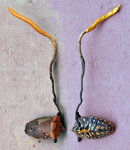
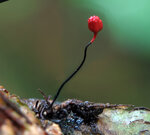
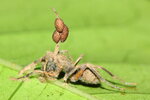
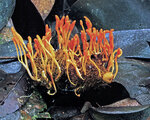
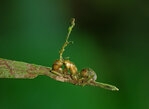
Will the human race be annihilated by a fungal infection?
Will fungi turn us all into homicidal zombies someday?
That is what the popular new HBO science fiction series, “The Last of Us” would have us all believe. In the show, a parasitic fungus called a “Cordyceps” infects humans, turning them into zombies and spreading throughout the world.
The story is compelling, if not horrific. But it’s not entirely fiction. It is true, for instance, that Cordyceps exist and have developed a technique that involves zombifying insects, controlling them by getting them to climb to the tippiest top of the highest branch of a tree. Then the parasite kills the insect, digesting their organs to grow a fingerlike spore pod out of their brains.
Yep, that all is true. “Summit Disease” is the term, and it describes how some species of Cordyceps infect insects and get them to climb to the tops of trees, all while digesting their organs, and finally killing them so they can then grow a spore pod out of their brains. This, in turn, releases millions of spores to repeat the cycle. Not only does it sound gross, but it’s a very graphic demise and perfect fodder for science fiction movies.
But no worries, fungi won’t kill us. Viruses are much more likely to do so as we have all recently seen with COVID-19. Viruses take days to mutate. Fungi take hundreds of thousands of years to do so, and besides, they cannot tolerate the heat of the human body either. They prefer to kill cold blooded insects, and eat them.
There are over a thousand species of Cordyceps, Ophiocordyceps and related genera which have taken hundreds of thousands of years to develop. Each individual species of Cordyceps can infect a very specific species of insect only. Not all ants, or caterpillars, or beetles, or spiders are infected, but one very specific species of a very specific insect can become their victims. Cordyceps are specialists, not generalists. For one Cordyceps species to learn to control a second additional ant species would take another hundred thousand years.
So, can fungi actually make insects into “zombies”? The debate here is if the fungus can actually “think” and control the muscle system of the insect to sort of drive it, to control all six of its legs and get it to go up to the top of a tree, then bite its mandibles deep into the twig holding itself steady while the fungus finishes killing it and grows a spore pod out of its head?
The alternative theory is that they simply control the insects’ instincts. When ants grow wings, their instincts often compel them to climb high in a tree and then launch themselves off into the air to fly away and multiply. It’s more likely that cordyceps have developed this technique, that of fungi controlling an insect’s natural instincts. Once they’ve done so, they can sit back and wait for the high-altitude results.
Cordyceps in the tropics are well known to parasitize cicadas, moths, spiders, ants, crickets, beetles and wasps, while some only digest seed pods or woody material and not insects at all. “Cordyceps nidus” attacks Trap Door Spiders. Once that happens, you’ll never see them open their trap doors again.
Cordyceps are not limited only to tropical zones, however. Even here in New England you can find various species such as the “Snaketongue Truffle Club” and the “Scarlet Caterpillar Club,” or “Cordyceps militaris” which, along with Cordyceps sinensis, is world famous for its reported medicinal properties to treat everything from kidney disease to sex drive to cancer. It is heavily harvested in China and Nepal as well as cultivated using grains as a substrate. To find Cordyceps militaris locally, you have to look carefully for the yellow to orange fingerlike spore-bearing pods, called “stroma” that stick up out of the soil from the moth pupae buried below.
HBO’s “The Last of Us” builds on our society’s deeply engrained fear called “mycophobia.” Stay away from what you don’t know about, and it won’t kill you. Anglo-Saxon cultures have long been
deeply mycophobic and the French, for example, have long ridiculed us for it.
Do fungi have a “hive mind”, a soul or intelligence? Can they think and decide anything?
I’d have to say “no” to all of those fearful concepts, but fungi can do some really bizarre things. “Slime molds”, colorful puddles of amoeba on the forest floor, spend their time eating bacteria, not trees or leaf litter. They can sacrifice their own cell, they only have one you know, and stack themselves up creating a different kind of “cell tower” upon which other slimes ooze up to continue their bacteria eating activities. They sacrifice themselves for the greater good.
Fungi have, in fact, killed lots of humans in the past. Ergotism, rye grain infected by “Claviceps purpurea,” caused a fungal affliction called St. Anthony’s Fire which killed tens of thousands of people in post-Roman Europe. It may have killed scores more because some of its symptoms are similar to the plague. Its symptoms were gangrene, burning in the limbs, hallucinations, convulsions, and often spontaneous dancing called “Tarantism.” As diets shifted toward wheat and better grain storage practices were adopted, this disease faded away. The fact that the alkaloids in ergot are also a source for the development of LSD is another odd offshoot of the fungal world.
In “The Last of Us”, humans actually bomb the city of Boston to try to stop the spread of fungi. But if you think about it, that will simply spread the spores more widely, right? Better off to simply bag each victim and contain them from “sporulating”, the term used for spreading one’s spores. If they could get us to bomb our own cities, the zombie fungal infection would truly have an even more winning strategy.
With a virus, at least we have a chance at developing a vaccine. With fungi, no vaccine defense is possible. The Irish potato famine, also due to a fungus, led to the breeding of a new resistant species of potato to combat it while allowing the old ones to simply die off. Might that be our demise too? This is all the stuff of nightmares. Sweet dreams…